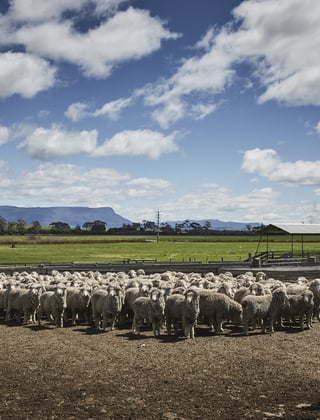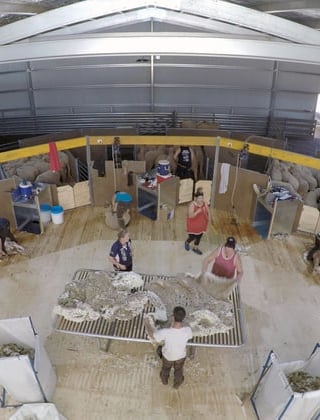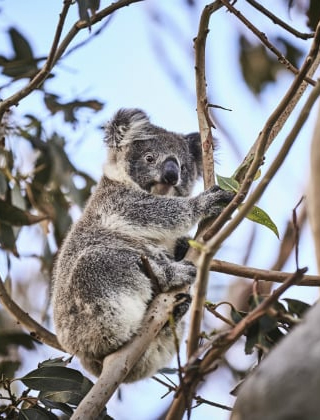Paul Simons: a life of ships, shops and sheep
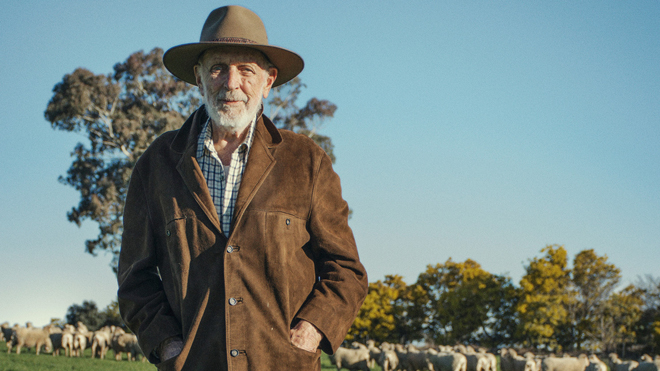
Paul Simons has had a remarkable career, from braving the North Atlantic in the Merchant Navy during the latter years of World War II, to leading the revival of Woolworths Limited as its Executive Chairman from 1987 to 1995. Additionally, for the past 40 years Paul has been a producer of quality wool, another vocation at which he has excelled.
Born in Swansea on the coast of South Wales in 1927, Paul came from humble beginnings in a time shaped by the uncertainties and financial hardships of the Great Depression and then war. He joined the Merchant Navy as a teenager in 1944 and went on to sail many times across the treacherous battlefield of the North Atlantic while carrying supplies from the USA to Britain and its Soviet allies.
At the end of the war, Paul stayed on in the Merchant Navy and travelled the world. It was during a trip in 1946 to Sydney that his life would change forever. While visiting an ice skating rink during shore leave, Paul met his future wife, Gwenda Grant. This chance meeting not only resulted in a happy marriage of nearly 40 years, but would also influence Paul’s later ventures into wool-growing; Gwenda was the niece of Lady Kate Merriman, wife of Sir Walter Merriman of Yass who was knighted for his services to the wool industry in 1954.
Not long after leaving the Merchant Navy in 1953, and now married to Gwenda, Paul joined Woolworths Limited in Sydney as a Management Trainee. His career in retail flourished at Woolworths and then Franklins. Paul rejoined Woolworths in 1987 as its Executive Chairman and is widely credited for turning around the fortunes of the struggling company. Paul has won a host of outstanding business awards during his career and is recognised as one of Australia’s great business leaders.
Moving into wool: Euralie and Glencoe
In 1982, with their thoughts turning to Paul’s future retirement from retail, Paul and Gwenda bought a wool-growing property, ‘Euralie’, near Yass in NSW. Euralie had originally belonged to the famous explorer Hamilton Hume, however it had been sadly neglected in more recent years. So while Gwenda set about renovating the Federation-style homestead and creating a wonderful garden, Paul busied himself with learning the business of growing wool.
Euralie is about 1,000 hectares and currently runs 4,000 superfine Merinos that annually produce 140 bales of 15-17 micron wool. At 96, Paul might now be Australia's oldest superfine woolgrower! Paul’s son David, a retired general surgeon, has now assumed overall supervision of the running of Euralie.
Having turned Euralie into a profitable enterprise, Paul in 2016 bought a second wool-growing property, ‘Glencoe’, 30km north-east of Boorowa, at which Paul and farm manager Tom Simson run about 10,000 sheep with 18-20 micron wool. ‘Glencoe’ is 3,159 hectares, made up of fertile valleys and granite slopes leading up to undulating native grassland flats surrounded by old-growth native woodlands.
Having confidence in the food and fibre industries, Paul saw significant capital gains to be made over time by investing in these productive farms.
“My focus at Euralie and Glencoe is on producing top-quality fleece while carrying out a high standard of environmental and animal welfare practices,” Paul said.
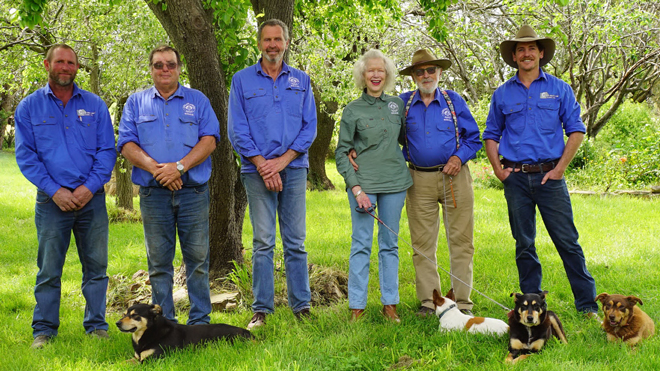
Paul Simons pictured in 2020 with his partner Lyndall Eeg, and (right to left) Tom Simson (Glencoe farm manager), David Simons (Paul’s son and successor), Malcolm Jones (former Euralie farm manager), and Damien Crozier (Tom’s former assistant at Glencoe). PHOTO: Peter Sykes
Investing in farm infrastructure
Not long after purchasing Euralie and then Glencoe, Paul invested in new shearing sheds for each property to help improve the handling of the sheep and provide first-class working conditions for the shearers and farm workers. Both sheds have undercover sheep yards attached to them.
The shearing sheds are solar panelled and generate the electricity used not only in the sheds and workshops, but also in all the residences on the properties. Always keen to look after his workers, Paul provides the shearers with comfortable accommodation and facilities.
Hay sheds have also been erected along with several silos storing grain for supplementary feeding during drought.
Two large dams have been created at Euralie to provide water security during drought. Glencoe has more than 20 dams. Solar pumps have been installed to draw water from the dams, local river (in the case of Euralie) and creeks to water tanks on high ground from which water is transported via a gravity-fed pipeline system to water troughs in the paddocks.
Focus on sustainability
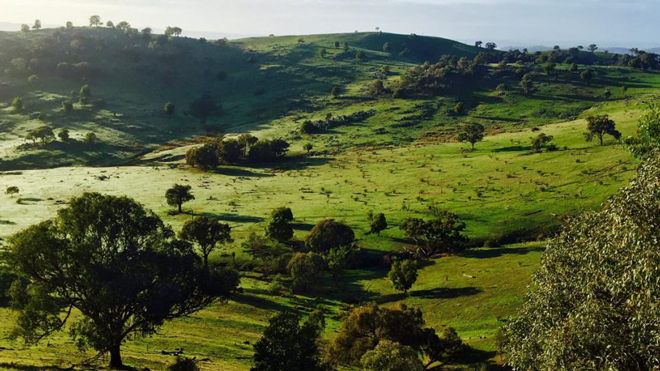
The green hills of Glencoe.
A keen advocate of land conservation and environmental sustainability, Paul’s philosophy for both Euralie and Glencoe is that farming must work in harmony with nature.
“The focus is not on pushing the land too hard, but rather preserving it so that it serves future generations,” Paul said.
“Furthermore, the provenance of fibre is becoming an essential marketing tool. At a basic level, we give the customer what they want and it’s a win-win for nature and our sheep too.”
Paul has implemented a massive tree planting operation. This helps prevent erosion, preserve the soil, retain water in the landscape, protect the creeks, and provide shelter for the flock and habitat for native fauna. Carbon capture is another benefit of the tree planting. More than 30,000 native trees and shrubs have been planted in shelter belts on Euralie during the past 19 years and past seven years at Glencoe.
Paul has also sectioned off a proportion of each property to retain its natural state: 20% of Euralie (200 hectares) and 25% of Glencoe (790 hectares). Over time, these areas are becoming a haven for biodiversity to flourish, including native animals, birds, reptiles, insects and vegetation. It also helps improve the health of the water, soil and air.
Ongoing pasture and soil improvement is undertaken on the properties. For example, although Glencoe is in a fertile area, tests showed that the soil was undernourished so half of the pasture is now fertilised (with environmentally friendly ‘worm juice’) each year with an over-sowing of clover and improved grass varieties if required.
“This enables us to not only keep more sheep and get more wool, but it is also easier to maintain the land and pastures in a more responsible, biodiverse and sustainable way – guaranteeing farming for many years to come,” Paul said.
The Australian National University in Canberra has commenced a research study of both Euralie and Glencoe to quantify the benefits of good environmental management. Both properties are RWS-accredited.
Animal health and welfare is also a priority on the properties. The practices recommended in the IWTO Guidelines for Wool Sheep Welfare are followed and no mulesing takes place. Losses of lambs from predation by foxes and birds of prey have been reduced by using neutered alpacas as guardian animals.
Quality and sustainability attracts buyers
Paul says the eco-credentials of the land and sheep that grow quality wool in Australia are increasingly being used by brands in their marketing to consumers.
“Discerning buyers of food or fibre seek quality from safe and sustainable origins,” Paul said.
Wool from Glencoe has been sourced by two notable Northern Hemisphere brands, with the wool’s origin featuring in the brands’ product marketing.
McNair Shirts of Yorkshire in England retails a fully traceable Provenance line of its iconic mountain shirts, showcasing the journey that the wool takes from Glencoe all the way through to the final garment. To highlight the full traceability of the shirts to consumers, McNair has documented the progress of the wool ‘from sheep to shirt’ on its website and social media channels.
Outdoor apparel company Devold of Norway launched a Sheep to Shop program in 2017 which provides full traceability at every step of its value chain. Representatives from Devold visited Glencoe in 2017, with Paul and Tom subsequently featured in Devold’s marketing; the company emphasised how Merino wool is a natural fibre renowned for being very fine and soft, and that it is grown at Glencoe using ethical and environmentally-sensitive farming.
Postscript
After the untimely death from cancer of Paul’s wife Gwenda in 1992, Paul retired as Executive Chairman of Woolworths in 1995 and fully retired from retail in 2000. Paul now lives principally at Euralie with his partner Lyndall Eeg.
Last year, Paul self-published a book of his life, aptly titled Ships, Shops and Sheep. Co-authored with Terry Larder, the book had a limited print run, but a second edition is planned that will be on sale to the public.
This article appeared in the March 2024 edition of AWI’s Beyond the Bale magazine. Reproduction of the article is encouraged.






